UNRWA Says Funding Cuts Have Pushed It to ‘Breaking Point’
Original article by JULIA CONLEY republished from Common Dreams under Creative Commons (CC BY-NC-ND 3.0).

The warning came as a U.S. intelligence officials said they have “low confidence” that Israel’s accusations against UNRWA workers were true.
Notifying the United Nations General Assembly of numerous steps Israel has taken in the last month to dismantle a humanitarian agency that serves millions of Palestinians, the U.N. Relief and Works Agency for Palestine Refugees in the Near East warned Thursday that it has reached a “breaking point” as it attempts to provide shelter and other aid amid Israel’s bombardment of Gaza with sharply reduced funding.
Since Israel claimed last month without providing evidence that 12 UNRWA staff members—out of 30,000 total—had been involved in a Hamas-led attack on southern Israel on October 7, 16 countries including the U.S., Germany, and Canada have suspended funding for the agency, which relies on donations to operate.
The funding cuts have gone into effect as UNRWA itself faces violence from the Israel Defense Forces (IDF), with 150 of the agency’s facilities having been hit by bombs or shelling that have killed more than 390 people and injured more than 1,300. Since October, the IDF has killed a total of at least 29,514 Palestinians in Gaza.
“It is with profound regret that I must now inform you that the agency has reached breaking point, with Israel’s repeated calls to dismantle UNRWA and the freezing of funding by donors at a time of unprecedented humanitarian needs in Gaza,” wrote Philippe Lazzarini, commissioner-general of UNRWA, in a letter to the president of UNGA.
Lazzarini warned that the agency’s ability to “fulfill the mandate given through General Assembly resolution 302,” the 1949 measure that created UNRWA and tasked it with providing aid to Palestinians in Gaza, “is now seriously threatened.”
UNRWA is a major employer of Palestinians in Gaza, where almost half of adults are unemployed. The agency runs schools for 300,000 children, provides housing assistance, runs health clinics, and oversees other public works such as playground and road construction.
Since Israel began its assault on Gaza in October, up to 1.9 million displaced Palestinians have found temporary housing at 154 UNRWA shelters, according to the agency.
Since Israel made its accusation against UNRWA, in addition to fueling a loss of $450 million in funding, the government has taken further steps to render it inoperable, despite Lazzarini’s immediate dismissal of the workers implicated in the allegations. Israeli officials have:
- Taken steps to evict UNRWA from the headquarters it’s used for 75 years in East Jerusalem;
- Limited visas for its staff to one or two months;
- Announced a plan to revoke UNRWA’s tax-exempt status;
- Suspended shipments of UNRWA goods;
- Blocked the agency’s bank accounts;
- Refused to grant hundreds of staffers access to UNRWA’s schools, health centers, and headquarters;
- Tabled bills to eliminate the agency’s U.N. privileges and immunities and to prevent “any activity by UNRWA in Israeli territory”; and
- Publicly accused UNRWA of being “in the service of Hamas.”
With UNRWA struggling to provide assistance to Gaza residents—about 85% of whom have been displaced and virtually all of whom are facing “crisis-level hunger“—Lazzarini warned UNGA President Dennis Francis that the agency is “on the edge of a monumental disaster with grave implications for regional peace, security, and human rights.”
“In the short term, dismantling UNRWA will undermine U.N. efforts to address Gaza’s humanitarian crisis and worsen the crisis in the West Bank, depriving over half a million children of education and deepening resentment and despair,” said Lazzarini. “In the longer-term, it will end UNRWA’s stabilizing role that is widely acknowledged, including by senior Israeli civilian and military officials and key donors, as vital to the rights and security of Palestinians and Israelis. It will also weaken prospects for a transition and a political solution to this long-standing conflict.”
Journalist Owen Jones noted on Friday that the “throttling” of Gaza’s primary humanitarian aid organization has taken place as Israel has failed to provide evidence of its claims against the UNRWA employees, with a U.S. intelligence assessment saying officials had “low confidence” that staff members had participated in the Hamas-led attack on October 7.
The assessment noted that Israeli officials have not “shared the raw intelligence behind” the accusations that led 16 countries to pull crucial funding from UNRWA—a fact that didn’t surprise Intercept journalist Ryan Grim.
“Why would Israel provide evidence?” said Grim. “Without any evidence, the U.S. suspended UNRWA funding and then [President Joe] Biden endorsed a new law permanently banning funding. Israel would be stupid to bother to present evidence, they know they don’t need to.”
In his letter to Francis, Lazzarini asked whether UNGA would allow “the parameters of peace for Palestinians and Israelis” to be “wiped away by obstructing UNRWA’s mandate and defunding the agency outside of any political agreement and consultation with Palestinians.”
“Should the General Assembly opt to continue to sustain UNRWA in the best interests of Palestine refugees, then I further appeal for a solution that closes the gap between UNRWA’s mandate and its funding structure, which relies upon voluntary contributions that make it vulnerable to wider political considerations, such as UNRWA faces now,” wrote Lazzarini.
“I finally appeal to the General Assembly to bring human rights and international law back to the center of multilateral action,” he added, “beginning with the catastrophic situation in Gaza that has worsened by every measure in recent weeks.”
Original article by JULIA CONLEY republished from Common Dreams under Creative Commons (CC BY-NC-ND 3.0).
